Florida
Residential Lease Agreement
THE LEASE IMPOSES IMPORTANT LEGAL OBLIGATIONS. MANY RIGHTS AND RESPONSIBILITIES OF THE PARTIES ARE GOVERNED BY CHAPTER 83, PART II, RESIDENTIAL LANDLORD AND TENANT ACT, FLORIDA STATUTES. A COPY OF THE RESIDENTIAL LANDLORD AND TENANT ACT IS ATTACHED TO THIS LEASE.
This Lease Agreement (hereinafter the "Lease Agreement") is dated as of _________ (hereinafter, the "Effective Date") and is entered into by and between _________ (the "Landlord") and the following residents:
_________
(The "Tenant(s)")
The Landlord and the Tenant(s) agree as follows:
1. PROPERTY AND OCCUPANTS
A. The Landlord is the owner of certain real property and improvements described as a house (hereinafter, the "Property") located at _________, _________, Florida _________. The Property is further described as follows: _________.
B. The Landlord rents to the Tenant(s) and the Tenant(s) rents from the Landlord the Property according to the terms and conditions described in this Lease Agreement (hereinafter, the “Lease Agreement”).
C. Unless otherwise indicated in the Lease Agreement, no other portion of the building (hereinafter, the “Building”) is included in the Lease.
D. The Property is for the sole use as a personal residence by the person(s) named above only.
2. TERM
The term of the Lease Agreement begins on _________ (hereinafter, the "Commencement Date"), and will terminate on _________ (hereinafter, the "Termination Date").
The Tenant(s) shall vacate the Property upon termination of the Lease Agreement, unless:
(i) The Landlord and the Tenant(s) have, in writing, extended this agreement or signed a new agreement.
(ii) Mandated by local rent control law.
(iii) The Landlord accepts Rent from the Tenant(s) (other than past due Rent), in which case a month-to-month tenancy shall be created which either party may terminate.
In this case, the Tenant(s) may terminate the tenancy by giving written notice at least 15 days prior to the intended termination date. The Landlord may terminate the tenancy by giving written notice as provided by law. Such notices may be given on any date. Rent shall be at a rate agreed to by the Landlord and the Tenant(s), or as allowed by law. All other terms and conditions of this Agreement shall remain in full force and effect.
3. MANAGEMENT
The Tenant(s) is hereby notified that the Owner or Landlord _________ is the property manager in charge of repairs or maintenance of the Property.
If the Tenant(s) has any complaint regarding any issue about the Property, _________ shall be contacted by one of the following methods:
Address: _________
Telephone: _________
Email: _________
4. RENT
The Tenant(s) shall pay the Landlord monthly rent in the amount of $_________ (hereinafter, the "Rent") for each full month during this lease. The full month's rent is due and payable not later than the first day, and is delinquent on the next day. If that day falls on a legal holiday, the rent is due on the next business day.
Please Take Notice that mail delays will not excuse the Tenant(s)’s obligation to pay the rent on a timely manner.
Place of Payment:
The Tenant(s) shall remit all rent payment amounts owed to the Landlord under this Lease Agreement to the Landlord and make all amounts payable to the following address:
_________
The landlord may later change the person and place to which the Tenant(s) must remit the rental amounts due under this Lease Agreement.
Please Take Notice that you must place the Property address and the Tenant(s)’s name on all payments.
Method of Payment:
The Tenant(s) shall pay all rent by selecting any of the following forms of payment (select one or more):
5. OCCUPANTS
During the Term of this Lease Agreement, the only individuals the Tenant(s) may permit to reside on the Property are the following:
_________
Unless otherwise consented by the Landlord, there shall be no more than _________ person(s) residing on the Property. All the provisions of the Lease Agreement are binding, individually, collectively, and severally, on each person occupying the Property, whether they are Tenant(s) or Occupants of the Property.
The Tenant(s) may not permit any guest to stay on the Property longer than _________ consecutive day(s) or _________ day(s) in a calendar year. The Tenant(s)'s guests shall not be considered original occupants of the Property under any circumstances.
The amount of time the Tenant(s)'s guests may stay on the Property may never be longer than the time permitted by any owners' association rule or restrictive covenant or _________ day(s) without Landlord's written permission, whichever is less.
6. USE OF PROPERTY
The Tenant(s) shall occupy and use the Property exclusively as a residential dwelling unit. No other uses shall be allowed to the Tenant(s) other than for residential dwelling purposes, except as may be allowed by the written consent of the Landlord and if and only if the alternate use is allowed under all applicable zoning laws. In such case, the Tenant(s) shall obtain liability insurance to cover any risks associated with an alternate use of the property.
Any material breach of this provision by the Tenant(s) constitutes valid grounds for eviction or lease termination.
7. ABSENCES
If the Tenant(s) vacates the Property for a prolonged time-period or abandons it, such Tenant(s) shall notify the Landlord in advance or the Landlord shall immediately have the right to terminate the Lease Agreement and remove all belongings, including any personal items off of the Property. No notice shall be given to the Tenant(s) by the Landlord to enter the Property if the Tenant(s) has abandoned or surrendered the Property.
Any material breach of this provision by the Tenant(s) constitutes valid grounds for eviction or lease termination.
8. MAINTENANCE
The Landlord shall be responsible for compliance with Florida Statutes §83.51 (Landlord's obligation to maintain Property), and will have the responsibility to maintain the Property at all times and perform all repairs reasonably necessary to meet the implied warranty of habitability of the Property, that is, that the property is in a safe and livable condition.
In accordance with Florida Statutes §83.52, during the Term of this Lease Agreement and any renewal thereof, Tenant(s) shall:
(1) Comply with all obligations imposed upon tenants by applicable provisions of building, housing, and health codes.
(2) Keep that part of the Property which he or she occupies and uses clean and sanitary.
(3) Remove from the tenant's dwelling unit all garbage in a clean and sanitary manner.
(4) Keep all plumbing fixtures in the dwelling unit or used by the tenant clean and sanitary and in repair.
(5) Use and operate in a reasonable manner all electrical, plumbing, sanitary, heating, ventilating, air-conditioning and other facilities and appliances, including elevators.
(6) Not destroy, deface, damage, impair, or remove any part of the Premises or Property therein belonging to the landlord nor permit any person to do so.
(7) Conduct himself or herself, and require other persons on the Property with his or her consent to conduct themselves, in a manner that does not unreasonably disturb the tenant's neighbors or constitute a breach of the peace.
9. REPAIRS
All requests for repairs must be in writing and delivered to the Landlord or Property Manager. Only in the event of an emergency related to the condition of the Property that materially affects the physical health or safety of an ordinary tenant, the Tenant(s) may call the Landlord.
The Tenant(s) may not repair or cause to be repaired any condition, regardless of the cause, without the Landlord’s permission. All decisions regarding repairs, including the completion of any repair, whether to repair or replace the item, and the selection of contractors, will be at the Landlord’s sole discretion.
The Landlord does not have a duty to repair or remedy a condition if:
(1) The Tenant(s) is delinquent in rent at the time a repair notice is given.
(2) The condition was caused by the negligent or wrongful act or omission of the Tenant(s), a member of the Tenant(s)'s family, or a guest or invitee of the Tenant(s) (unless the condition was caused by normal wear and tear), in accordance with Florida Statutes §83.51(4).
The parties agree that 7 days is a reasonable period of time for the Landlord to make a diligent effort to repair a condition unless there are circumstances which establish that a different period of time is appropriate (such as the severity and nature of the condition and the availability of materials, labor, and utilities).
If, in an emergency, it shall become necessary to make any repairs or replacements by the Tenant(s) without prior written consent from the Landlord, at Landlord's expenses, and such repairs or replacements are found to be unsatisfactory and to have caused additional damages, the Tenant(s) shall reimburse Landlord for the cost of making such repairs.
10. UTILITIES AND SERVICES
The Tenant(s) shall be solely responsible for and shall pay expenses for all utilities and services used or consumed at the Property.
11. HAZARDOUS MATERIALS
The Tenant(s) shall not keep or have on the Property any article or item of a dangerous, flammable, or explosive material that might unreasonably increase the danger of fire or explosion on the Property or that might be considered hazardous or extra hazardous by any responsible insurance company.
12. LANDLORD ACCESS TO PROPERTY
The Landlord and the Landlord's agents shall have the right at all reasonable times, and by all reasonable means during the term of this Lease Agreement and any renewal thereof, to enter the Property for the following purposes:
(i) Survey the Property’s condition and take photographs to document the condition.
(ii) Make repairs or improvements to the Property.
(iii) Supply agreed services.
(iv) Show the Property to prospective buyers or tenants.
(v) Exercise a contractual or statutory lien.
(vi) Leave a written notice.
(vii) Seize nonexempt property if the Tenant(s) is in default.
Except in case of emergency, the Landlord will give the Tenant(s) reasonable notice of intent to enter. For these purposes, twenty-four (24) hour written notice will be deemed reasonable.
13. RADON GAS NOTIFICATION
As required by law, Landlord makes the following disclosure: “RADON GAS”. Radon is a naturally occurring radioactive gas that, when it has accumulated in a building in sufficient quantities, may present health risks to persons who are exposed to it over time. Levels of radon that exceed federal and state guidelines have been found in buildings in Florida. Additional information regarding radon and radon testing may be obtained from your county health department.
14. LIENS
The interest of the Landlord shall not be subject to liens for improvements by the Tenant(s) as provided in Florida Statutes § 713.10. The Tenant(s) shall notify all parties performing work on the Property at the Tenant(s)'s request that the Lease does not allow any liens to attach to Landlord’s interest.
15. ASSIGNMENT / SUBLETTING
The Tenant(s) shall not, without the prior written consent of the Landlord, which may be withheld at the Landlord's sole discretion, voluntarily or involuntarily assign, mortgage, encumber or hypothecate this Lease or any interest herein or sublet the Property or any part thereof.
The Tenant(s) is specifically prohibited from offering all or part of the Property for short-term rental such as through Airbnb, Vrbo, or other such sites or programs. Any advertising or on-line postings as well as actual rentals of the Property to vacation or short-term guests shall constitute a material breach of this Lease Agreement.
Any person who is not a tenant who occupies any portion of the Property, for any period of time whatsoever, for any compensation or consideration whatsoever (including, without limitation, the payment of money and/or trade and/or barter of other goods, services, or property occupancy rights) is NOT a guest, and such occupancy constitutes unauthorized subletting or assignment which is a substantial and material breach of this Lease Agreement.
16. NOTICES
Notice required by statute will be given in accordance with the applicable statute. All other notices shall be deemed sufficient if made as follows:
(i) All notices to the Landlord shall be directed by personal delivery or first class mail to the Landlord at the appropriate address set forth below, until Tenant(s) is notified, in writing, to the contrary.
(ii) All notices to the Tenant(s) shall be directed by personal delivery or first class mail to the Tenant(s) at the leased Property or any forwarding address provided in writing by the Tenant(s) to the Landlord.
Landlord:
_________
_________
Tenant:
_________
_________, _________, Florida _________
Such addresses may be changed from time to time by any party by providing notice as set forth above.
17. VENUE AND GOVERNING LAW
Exclusive venue is in the county where the Property is located. This Lease Agreement shall be governed, construed and interpreted by the Laws of the State of Florida.
IN WITNESS WHEREOF, the Landlord and Tenant have executed this Lease Agreement in the manner prescribed by law as of the Effective Date.
LANDLORD:
By: ____________________________ Date: ______________
_________
_________
TENANT:
By: ____________________________ Date: ______________
_________
Florida Statutes Section 83.67. Prohibited practices
(1) A landlord of any dwelling unit governed by this part shall not cause, directly or indirectly, the termination or interruption of any utility service furnished the tenant, including, but not limited to, water, heat, light, electricity, gas, elevator, garbage collection, or refrigeration, whether or not the utility service is under the control of, or payment is made by, the landlord.
(2) A landlord of any dwelling unit governed by this part shall not prevent the tenant from gaining reasonable access to the dwelling unit by any means, including, but not limited to, changing the locks or using any boot lock or similar device.
(3) A landlord of any dwelling unit governed by this part shall not discriminate against a servicemember in offering a dwelling unit for rent or in any of the terms of the rental agreement.
(4) A landlord shall not prohibit a tenant from displaying one portable, removable, cloth or plastic United States flag, not larger than 4 and 1/2 feet by 6 feet, respectfully in or on the dwelling unit regardless of any provision in the rental agreement dealing with flags or decorations. The United States flag shall be displayed in accordance with s. 83.52(6). The landlord is not liable for damages caused by a United States flag displayed by a tenant. Any United States flag may not infringe upon the space rented by any other tenant.
(5) A landlord of any dwelling unit governed by this part shall not remove the outside doors, locks, roof, walls, or windows of the unit except for purposes of maintenance, repair, or replacement; and the landlord shall not remove the tenant's personal property from the dwelling unit unless such action is taken after surrender, abandonment, recovery of possession of the dwelling unit due to the death of the last remaining tenant in accordance with s. 83.59(3)(d), or a lawful eviction. If provided in the rental agreement or a written agreement separate from the rental agreement, upon surrender or abandonment by the tenant, the landlord is not required to comply with s. 715.104 and is not liable or responsible for storage or disposition of the tenant's personal property; if provided in the rental agreement, there must be printed or clearly stamped on such rental agreement a legend in substantially the following form:
BY SIGNING THIS RENTAL AGREEMENT, THE TENANT AGREES THAT UPON SURRENDER, ABANDONMENT, OR RECOVERY OF POSSESSION OF THE DWELLING UNIT DUE TO THE DEATH OF THE LAST REMAINING TENANT, AS PROVIDED BY CHAPTER 83, FLORIDA STATUTES, THE LANDLORD SHALL NOT BE LIABLE OR RESPONSIBLE FOR STORAGE OR DISPOSITION OF THE TENANT'S PERSONAL PROPERTY.
For the purposes of this section, abandonment shall be as set forth in s. 83.59(3)(c).
(6) A landlord who violates any provision of this section shall be liable to the tenant for actual and consequential damages or 3 months' rent, whichever is greater, and costs, including attorney's fees. Subsequent or repeated violations that are not contemporaneous with the initial violation shall be subject to separate awards of damages.
(7) A violation of this section constitutes irreparable harm for the purposes of injunctive relief.
(8) The remedies provided by this section are not exclusive and do not preclude the tenant from pursuing any other remedy at law or equity that the tenant may have. The remedies provided by this section shall also apply to a servicemember who is a prospective tenant who has been discriminated against under subsection (3).
Copy of Current Version of the Florida Residential
Landlord and Tenant Act, Part II, Chapter 83
Florida Statutes Should Be Attached
RESIDENTIAL LEASE
Inspection Checklist
Address: _________, _________, Florida _________
The Tenant(s) has inspected the Property and states that the Property is in satisfactory condition, free of defects, except as noted below:
| SATISFACTORY | COMMENTS |
| Bathrooms | _________ | _________________________ |
| Carpeting | _________ | _________________________ |
| Ceilings | _________ | _________________________ |
| Closets | _________ | _________________________ |
| Countertops | _________ | _________________________ |
| Dishwasher | _________ | _________________________ |
| Disposal | _________ | _________________________ |
| Doors | _________ | _________________________ |
| Fireplace | _________ | _________________________ |
| Lights | _________ | _________________________ |
| Locks | _________ | _________________________ |
| Refrigerator | _________ | _________________________ |
| Screens | _________ | _________________________ |
| Stove | _________ | _________________________ |
| Walls | _________ | _________________________ |
| Windows | _________ | _________________________ |
| Window coverings | _________ | _________________________ |
| _________ | _________ | _________________________ |
| _________ | _________ | _________________________ |
_____________________
Date
TENANT:
By: ____________________________ Date: ______________
_________
Acknowledged by Landlord:
By: ____________________________ Date: ______________
_________

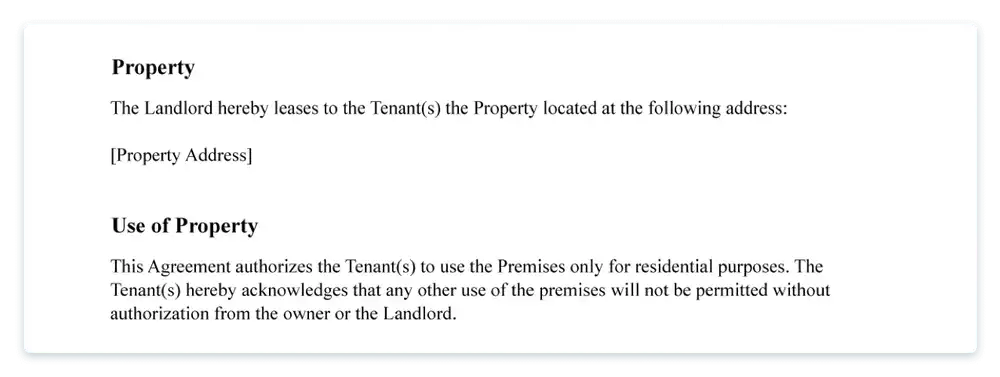
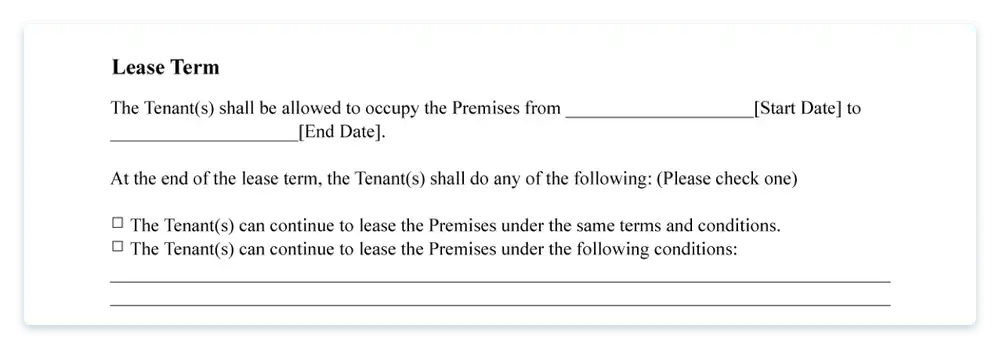
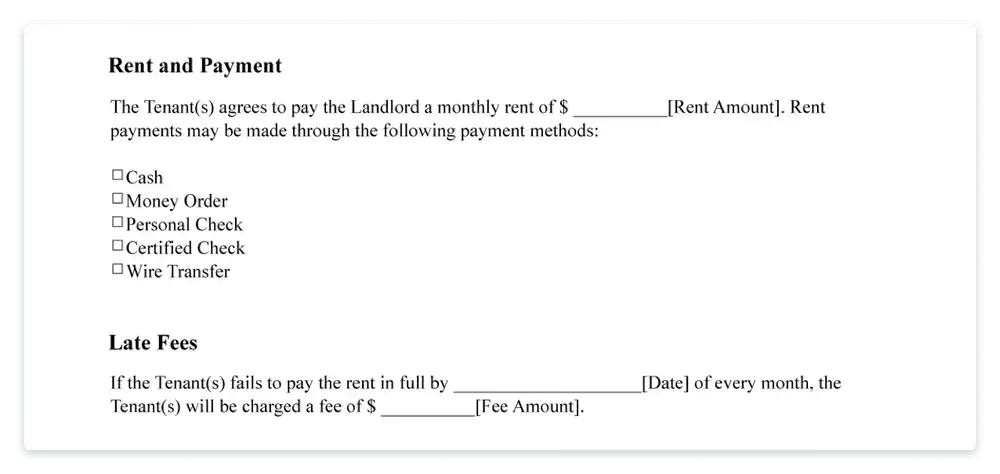


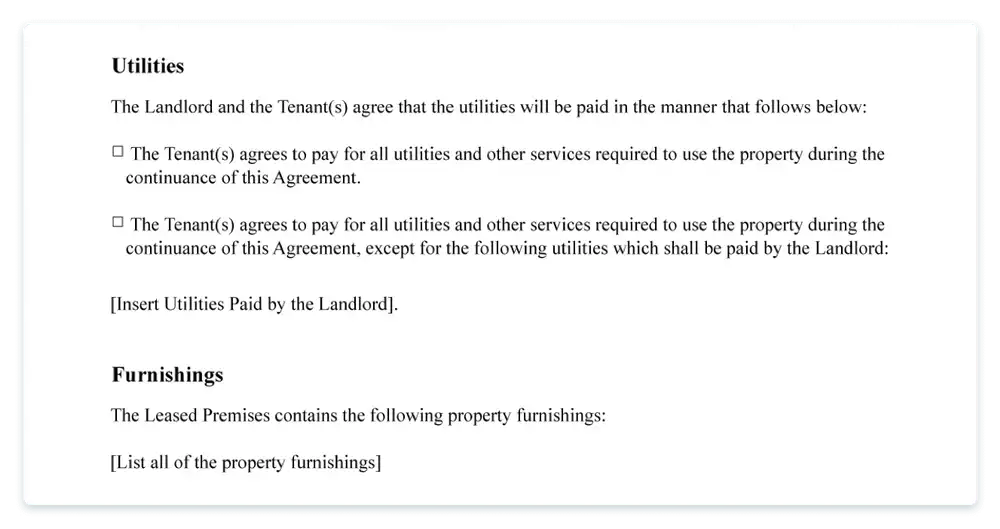

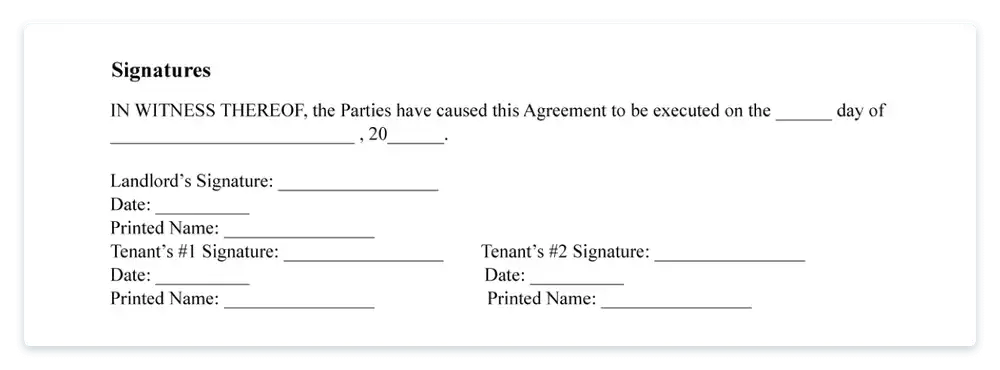 By using our Florida Lease Agreement template you can draft this entire document in minutes without any mistakes.
By using our Florida Lease Agreement template you can draft this entire document in minutes without any mistakes.